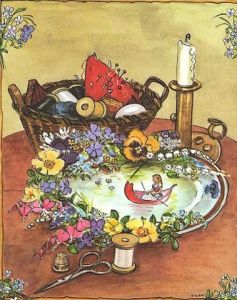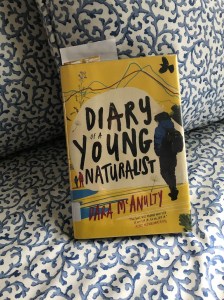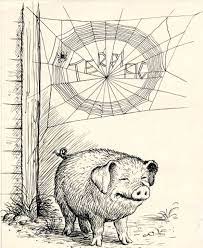the rare company of an especially fine book
by bam

long, long ago, the one certain place where i escaped in the house where i grew up, where i all but opened the window and soared out through the oaks, was beneath the covers of a patchwork quilt in my upstairs room where i’d hide for hours on end in the pages of an opened book.
the very architecture of a book is built for drawing you in: there’re the pages opening like spread-wide angels’ wings, there’s the tucked-in gulley where those pages are hinged to the spine, the gulley that demands ocular acrobatics, as your eyeballs make the leap from one page’s bottom to another one’s top. it’s an enclosing space, the sprawl of a book, a paper-and-glue construction akin to being wrapped in the long arms of a hug.
back in the days when the books i read were washed in watercolor from the brushes of tasha tudor, or in the black ink of garth williams, i could get lost in a book from sun-up till starlight.
i’d wager a bet that those were the pages that imprinted on me the storybook poetries that have shaped every room of my grown-up house — the ticking and chiming of old schoolhouse clocks, windowpanes that peer into trees, birdhouses on poles, amply padded armchairs upholstered in checks, teapots that whistle, and logs that crackle in hearths.
that itch to escape — really, more of a pang or an unstoppable pull — still lures me, especially as the affairs of the world seem to crumble, as the ends of my nerves feel rubbed raw with brillo and steel wool. it might be why the walls of this old house are stacked, floor to ceiling in plenty of rooms, in tight-soldier rows of spine after spine. books are the balm, the antidote to so much of the madness beyond our front doors.
especially so is a book i tumbled into only this week. it’s a book for the soul, if ever there was. it’s a book for the tenderhearted, to which i most assuredly and emphatically admit. it’s diary of a young naturalist, by dara McAnulty, who not only is a teenager (a northern irish one) but one with extraordinary voice and vision. he’s autistic, he lets you know before you’ve come to the end of the prologue. but before he tells you that, he describes himself thusly: “i have the heart of a naturalist, the head of a would-be scientist, and the bones of someone who is already wearied by the apathy and destruction wielded against the natural world.”
count me as a kindred spirit.
even more so, he lets on again and again how trampled his heart often feels, how porous it is, and how solace for him comes in the tendernesses of the unfiltered natural world.
the book has bedazzled the literary world. young dara, all of fourteen when he penned these glorious pages, won the wainwright prize, britain’s blue ribbon for nature writing, for this, his debut work. that his words found their way into a book, let alone a prize-winning book, is a feat in and of itself; “quite amazing,” he writes, “as a teacher once told my parents ‘your son will never be able to complete a comprehension (a mandatory exam in the british educational system), never mind string a paragraph together.'”
well, string paragraphs he has done. has done, indeed. has done to the tune of 222 pages.
he’s been compared to the incomparable greta thunberg, perhaps the planet’s fiercest defender and an unfiltered critic of our devastations thereof. the guardian of london sang the diary’s praises, calling it “miraculous,” writing that it’s “a combination of nature book and memoir, a warm portrait of a close-knit family and a coming-of-age story,” in which McAnulty’s “simple, gorgeous sentences unfurl, one after another.” the poet aimee nezhukumatathil called it “at once a lush and moving meditation and electric clarion call to action.” reviewers, in the UK and here in the states, have heaped it with praise. “it really is a strange and magical experience,” wrote a reviewer in the daily mail, before comparing McAnulty’s writing to that of the poet ted hughes. another reviewer, one in the guardian, said McAnulty’s writing reminded him again and again of the great WH Hudson, a brilliant and eccentric nature writer “who lived with the same deep and authentic sense of emotional engagement with nature as McAnulty.”
weaving across the arc of a year, paying exquisite attention to season upon season, McAnulty drops us all to our knees, as we behold, along with him, the wonders of barn owls, cowslips, corncakes, and the summer’s first blackberries.
of the poetry of a blackbird’s morning sonata: “When the blackbird came, I could breathe a sigh of relief. It meant the day had started like every other. There was a symmetry. Clockwork.”
of dandelions: “Dandelions remind me of the way I close myself off from so much of the world,” he writes, “either because it’s too painful to see or feel, or because when I am open to people, the ridicule comes.”
a hidden pond: “…reflecting the sky and squiggling with shadows galore, darting in and out of the light. A convulsing mass of tadpoles, and with them the epic cycle of life, anticipation and fascination.”
springtime: “The ebb and flow of time punctuated by the familiar brings a cycle of wonder and discovery every year, just as if it’s the first time. That rippling excitement never fades. The newness is always tender.”
for a girl whose jangled nerves and galloping heart are soothed and slowed by the poetries of startling never-before-so-captured language, McAnulty is bliss by the spoonful. he describes his family as “close as otters,” and in describing a soaring white seabird he writes of “the art deco lines” of the gannet. caterpillars move “like slow-motion accordions,” and a goshawk chick looks “like an autumn forest rolled in the first snows of winter.”
as if that’s not more than more than plenty, here are but two excerpts:
Prologue
This diary chronicles the turning of my world, from spring to winter, at home, in the wild, in my head. It travels from the west of Northern Ireland in County Fermanagh to the east in County Down. It records the uprooting of a home, a change in county and landscape, and at times the de-rooting of my senses and my mind. I’m Dara, a boy, an acorn. Mum used to call me lon dubh (which is Irish for blackbird) when I was a baby, and sometimes she still does. I have the heart of a naturalist, the head of a would-be scientist, and the bones of someone who is already wearied by the apathy and destruction wielded against the natural world. The outpourings on these pages express my connection to wildlife, try to explain the way I see the world, and describe how we weather the storms as a family……I started to write in a very plain bungalow surrounded by families who kept their children behind closed doors, and empty-nesters who manicured their gardens and lawns with scissors – yes, I actually witnessed this. This is where sentences first began to form, where wonder grappled with frustration on the page, and where our garden (unlike any other in the cul-de-sac) became a meadow during the spring and summer months, with wildflowers and insects and a sign that read ‘Bee and Bee’ staked in the long grasses, and where our family spent hours and hours observing the abundance that other gardens lacked, all of us gloriously indifferent to the raised eyebrows of neighbours that appeared from behind curtains from time to time.
Wednesday, August 1
We watch in wonder as countless silver Y moths feast on the purple blooms. Some rest, drunk with nectar, before refilling, whirling and dancing in constant motion. The feather-like scales, brown flecked with silver, are shimmering with starry dust, protecting them from being eaten by our other nocturnal neighbours. I find it fascinating that silver Y fur can confuse the sonar readings of bats, and even when they are predated they can escape, leaving the bat with a mouthful of scales. And here we all are, the McAnultys congregated in worship of these tiny migrants. Soon they will make the journey to their birthplace, silver stars crossing land and sea to North Africa.The night crackles as the storm of flitting moves off. We jump up and down and hug each other, tension leaking out. We chat and look at the sky, sparkling with Orion, Seven Sisters and the Plough. This is us, standing here. All the best part of us, and another moment etched in our memories, to be invited back and relived in conversations for years to come. Remember that night, when fluttering stars calmed a storm in all of us.
Dara McAnulty, Diary of a Young Naturalist
part of the miracle of McAnulty’s writing is that he writes as evocatively about his neurocognitive otherness as he does about the dandelions, the otters, and the caterpillars. he is something of a spelunker into the unexplored wilds of the world seen through an asperger’s lens.
again, from the prologue, where he writes matter-of-factly:
“Not only is our family bound together by blood, we are all autistic, all except Dad [a conservationist] — he’s the odd one out, and he’s also the one we rely on to deconstruct the mysteries of not just the natural world but the human one too. Together, we make for an eccentric and chaotic bunch. We’re pretty formidable, really. We’re as close as otters, and huddled together, we make our way out in the world.”
he writes, bracingly, about being bullied. about how, under the fluorescent lights of a classroom, he feels “boxed in, a wild thing caged.” he writes of the foul-mouthed insults hurled his way. simply because he’s not like the others.
i’d say he’s beyond them.
reading his stripped-bare sentences, my eyes stung with tears. and in his aloneness, i felt the walls of my own heart reaching toward his. i found not merely comfort, but the rarest of company.
how blessed is the world that from his distant landscape of otherness, he makes art from life’s murkiest shadows to its patches of purest white light.
McAnulty’s latest book, wild child: a journey through nature, a multi-sensory jaunt through the wilds especially for children, was published last summer, and described as a “dreamy dive” into the natural world. he’s planning another book about his wanderings around ireland, connecting nature with myth. i’ve taken a number and am already standing in line for that one.
for i’ve found, in the pages gloriously inscribed by a boy who writes in tender tones, who sees the world in ways that make me truly see, a kindred spirit, a diarist who makes me feel safe and warmed in the clutches of this holy, holy earth.
what are the titles that bring you comfort in these trying times? and how precisely do they do so?





hello beautiful chair friends. i just realized there was a formatting wackiness when i sent this out this morning, so i’ve fixed it, and hopefully you can read what had been a totally squished paragraph (between the images of two of my most treasured illustrators).
for those who get their posts by email, though, the fixes never show up. i can mostly only see how this looks on a laptop when writing it, and sometimes i later see that the formatting on phones is not what i expected. the version here on the site itself is usually the way i hope it’s seen. apologies if formatting is wacky in other versions.
i was trying to see if i could — like some other blogs i’ve gotten — have only the top grafs sent via email, and then you click the email to come to the full post here on the site itself (thus, you’d have the fixes in formatting), but that was above my pay grade. in any case, if formatting in email or on phones is ever weird, clicking onto the site itself should lead to the cleanest version.
mostly, thank you for reading in whatever form, and with or without whatever blips. ❤ ❤
Knowing that you cherish Charlotte’s Web and Tasha Tudor’s Book of Fairy Tales as dearly as I, the illustrations for this post alone would have informed me that this is a book -not- to be missed. My world-weary heart and I cannot wait to take refuge within its pages… Thank you, bless you, for the veritable lifeline of this most gorgeous and timely review. ❤ xoxo
you are so so welcome, my kindred friend. like you, words are a most certain lifeline, one i often clutch white-knuckled. but there are dara McAnulty’s in the world. and there are Amys from Illinois. and there is a village we knowingly call “the chair.” as i wrote to you recently, the passport to this gentle village is simple kindness + gentle tone. a spark of curiosity and humble air always seem to travel in the company of the kindness and gentle natures….
I’ve requested it from my library. Should have it in a day or two. I’ve gotta say that this line that you shared: “when I am open to people, the ridicule comes” broke my heart.
broke my heart too. he is so supremely transparent, so willing to put his vulnerable whole on the line (in that mysterious way that writers sometimes are so much more transparent on the page or screen than they might be in the flesh), and he writes of his autism so matter-of-factly and without drama that lines like that one are written almost in passing, and the gut punch wastes no time in bending you over.
can’t wait to hear which lines leap off the page for you….xoxox
Just finished “Braiding Sweetgrass“ by Robin Wall Kimmerer. Not being able to travel and hike last year or this year, this was almost as good, being able to imagine being in the nature she so beautifully described. Like HH, I have McAnulty on hold at the library and will look forward to it. Sending ❤️🩹 for your achy heart.
oh, dear darling, you will love. and ache. and love some more. how blessed that a circle of readers will be surrounding dara with our own tender, tender hearts….
What a remarkable young man, and what a remarkable family he has! I too will be reading it. My book club is on hold again, so I appreciate your wonderful recommendation. What really captured my interest (and my heart) was his comment, “Not only is our family bound together by blood, we are all autistic, all except Dad…the one we rely on to deconstruct the mysteries of not just the natural world, but the human one too.” I’m out the door and on my way to the library as soon as it opens.
that line captured me too.
i am picturing you in your track shoes, sitting on a bench outside the library door, waiting, waiting, for the nice library folk to let you in before you have to bang down the door!
the interlacing of dara’s writing about the wonders and awe of the natural world (especially the avian world), and his seamless truth-telling in which he takes us into his autism is really breathtaking.
blessed reading, dear friend. xoxox